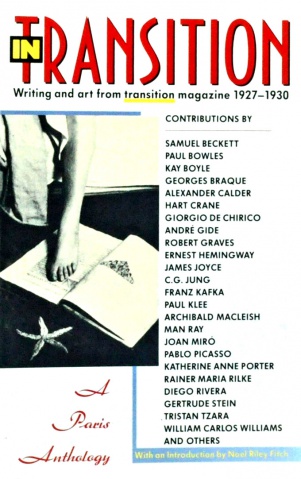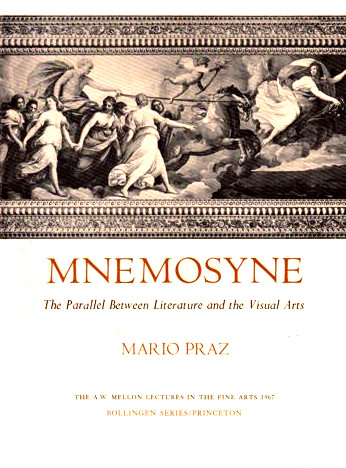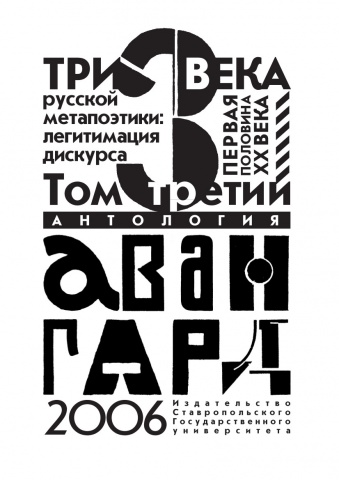In Transition: A Paris Anthology: Writing and Art from Transition Magazine 1927-30 (1990)
Filed under book, magazine, poetry | Tags: · art, avant-garde, dada, expressionism, literary theory, literature, poetry, surrealism

A selection of the some of the best writing to appear in transition, an experimental literary journal that featured surrealist, expressionist, and Dada art and artists. Founded in 1927 by Paris-based poet Eugene Jolas, it was originally intended to serve as an outlet for experimental poetry, but gradually expanded to incorporate contributions from sculptors, photographers, writers, civil rights activists, critics, and cartoonists. The magazine ran through the spring of 1938, with a total of 27 issues published.
With texts by Samuel Beckett, Paul Bowles, Kay Boyle, Georges Braque, Alexander Calder, Hart Crane, Giorgio De Chirico, Andre Gide, Robert Graves, Ernest Hemingway, James Joyce, C. G. Jung, Franz Kafka, Paul Klee, Archibald MacLeish, Man Ray, Joan Miro, Pablo Picasso, Katherine Anne Porter, Rainer Maria Rilke, Diego Rivera, Gertrude Stein, Tristan Tzara, William Carlos Williams and others.
With an Introduction by Noel Riley Fitch
Publisher Anchor Books, Doubleday, New York, 1990
ISBN 0385411502, 9780385411509
256 pages
via leninbert
PDF
Scans of 18 issues of the magazine (at National Library of France)
Mario Praz: Mnemosyne: The Parallel Between Literature and the Visual Arts (1970–) [English, Spanish]
Filed under book | Tags: · art, art history, art theory, history of literature, literary theory, literature, memory, poetry

In his search for the common link between literature and the visual arts, Professor Praz draws upon the abundant evidence of long mutual understanding and correspondence between the sister arts. Although parallels of theme and inspiration are plentiful, he is not primarily concerned with these. Rather, he examines the close relationship or air de famille between the expression of the arts in any given epoch.
Each epoch has “its peculiar handwriting or handwritings, which, if one could interpret them, would reveal a character, even a physical appearance.” Although handwriting is taught and some of its characteristics thus belong to the general style of the period, the personality of the writer does not fail to pierce through. Something of the same sort, the author proposes, occurs in art. The kinship of literature and painting rests on this circumstance: a work of art, whether visual or literary, must use the distinctive “handwriting” of its particular age, even as its originality pierces through this handwriting.
The likeness between the arts within various periods of history can ultimately be traced, then, to structural similarities — similarities that arise out of the characteristic way in which the people of a certain epoch see and memorize facts aesthetically. Mnemosyne, at once the goddess of memory and the mother of the muses, therefore presides over this view of the arts. In illustrating her influence, Professor Praz ranges widely through Western sources, both literary and pictorial. (from the dust jacket)
The A.W. Mellon Lectures in the Fine Arts, 1967
Publisher Princeton University Press, 1970
Bollingen Series XXXV, 16
ISBN 9780691098579
261 pages
Review (E.H. Gombrich, 1972)
Review (D.C., Spenser Newsletter, page 3, 1971)
Review (in Japanese)
Publisher (EN)
Mnemosyne: The Parallel between Literature and the Visual Arts (English, 1970)
Mnemosyne: El paralelismo entre la literatura y las artes visuales (Spanish, trans. Ricardo Pochtar, 1979, no OCR, via Daniel Ferreira)
K.E. Shtayn (ed.), Three Centuries of Russian Metapoetics, Vol. 3: Avant-Garde: Cubo-Futurism, Ego-Futurism, Centrifuge, Rayonism, Imaginism, Proletkult, LEF, VAPP, Constructivism, Oberiu (2006) [Russian]
Filed under book | Tags: · 1910s, 1920s, 1930s, art history, avant-garde, constructivism, cubo-futurism, ego-futurism, formalism, futurism, literary theory, literature, poetry, proletkult, russia, visual poetry

An encyclopedic collection of Russian literary avant-garde writing of the first half of the 20th century.
Tri veka russkoy metapoetiki: Legitimatsiya diskursa, Tom 3: Pervaya polovina XX veka. Avangard: Kubofuturizm. Egofuturizm. Tsentrifuga. Luchizm. Imazhinizm. Proletkul’t. Lef. VAPP. Konstruktivizm. OBERIU
Publisher Izdatelstvo Stavropolskogo gosudarstvennogo universiteta, Stavropol, 2006
ISBN 5886485120
830 pages
Russian avant-garde bibliography at Monoskop wiki
PDF
See also Russkaya metapoetika. Uchebnyy slovar, 2006
Download another 3 volumes

